Very Cheesy Cheese Scones
Very Cheesy Cheese Scones might just be the fluffiest, cheesiest, best cheese scones ever! Warm from the oven, split and spread with butter, there can’t be many home baked savouries that are so comforting yet take hardly any time and effort. Ready to enjoy in around 30 minutes.
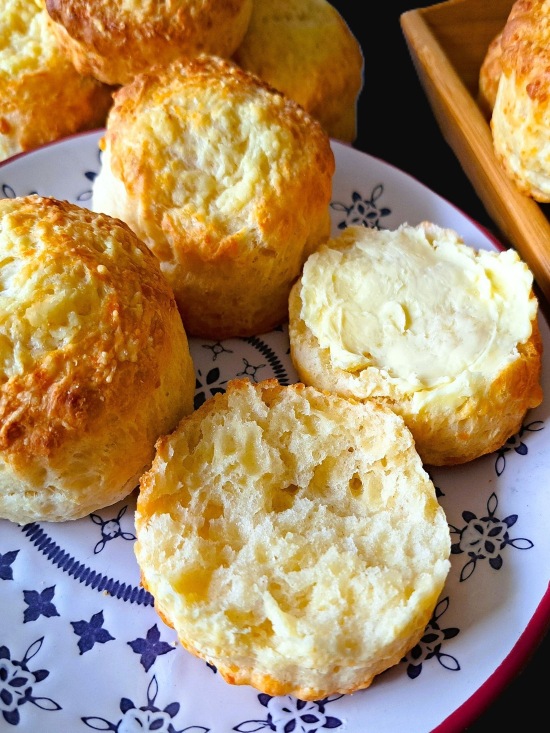
Disclosure: this post may contain affiliate links. If you buy via my links, I may earn a small commission at no extra cost to you.
Jump to Recipe
This is an updated version of a post first published in 2018.
SCONES: HOMEMADE VS SHOP BOUGHT
I love scones of all types. Classic Sultana Scones of course, but also savoury scones. But I never buy them because they’re almost always bland, boring and dry.
I think mass-produced cheese scones are the most disappointing of all. Often looking tasty and cheesy enough, the ones I’ve tried have very little flavour and an unpleasant, dry texture. And that includes ones claiming to be ‘made the truly Artisanal way’.
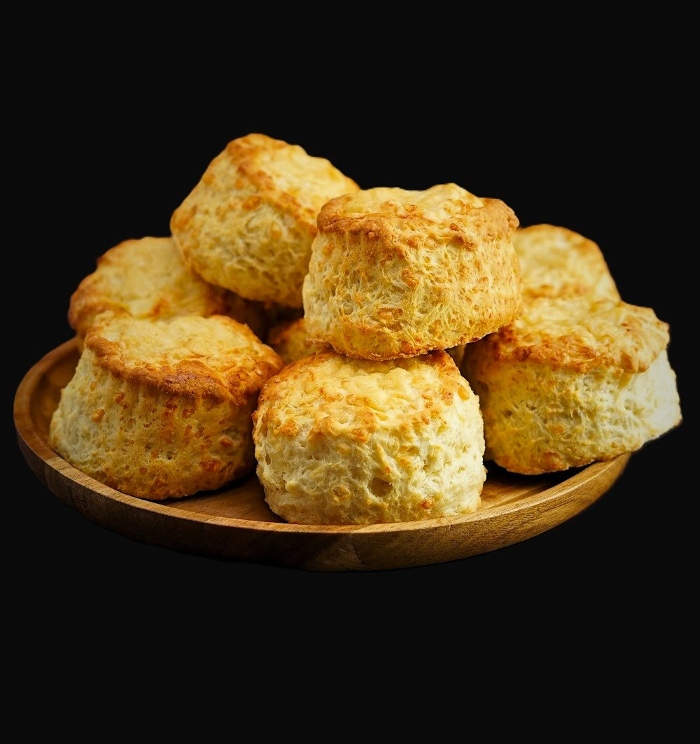
The good news though is that, like all scones, the cheese variety are incredibly quick and easy to make at home. All you need are basic ingredients like self-raising flour, baking powder, salt, butter, cheese, plus a liquid such as yogurt, milk or buttermilk to bring the dough together.
But the most important thing for making the best cheese scones is, unsurprisingly, a well-flavoured mature cheese. And plenty of it. That’s why I’ve called my delicious, fluffy version Very Cheesy Cheese Scones.
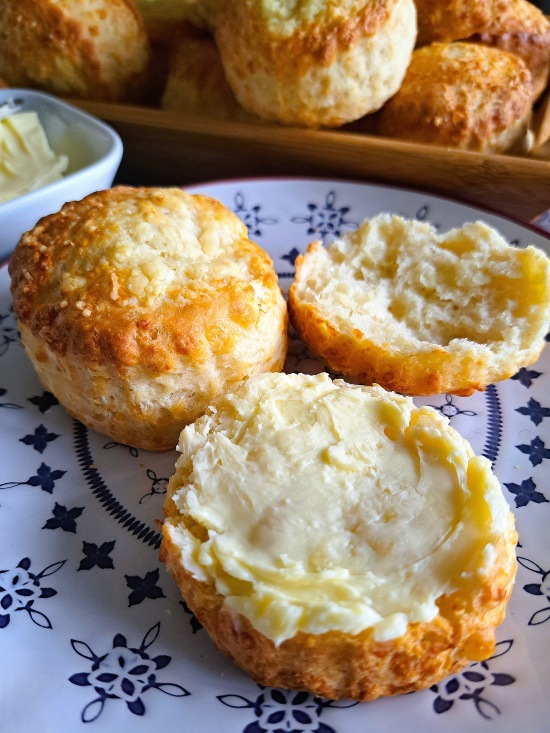
EASY VERY CHEESY CHEESE SCONES
You’ll find a recipe card at the end with full instructions and ingredient amounts. But I highly recommend you read the whole of this post before beginning the recipe. Here you’ll find extra tips plus step-by-step images to help you.
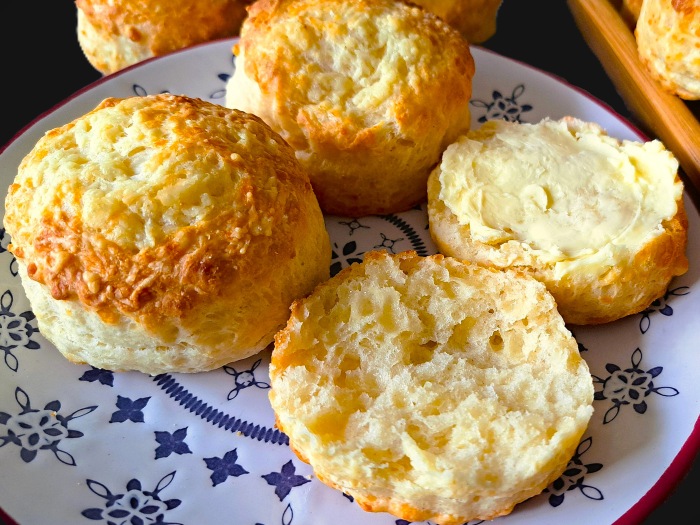
MAKING THE DOUGH
To make the scone dough, start by sifting into a bowl the self-raising flour, baking powder and a large pinch of salt. Although the flour already has raising agents in it (the clue is in the name), for scones I like to add additional baking powder to help achieve a good height. Tip: raising agents can quickly lose their power, so make sure both flour and baking powder are well within their Best Before date and, if opened, that they’ve been stored in airtight containers.
Next, add the butter (I grate it in or you could dice it) then rub into the flour mixture. Now, lots and lots of grated cheese is stirred in. A mature Cheddar is ideal. Gruyere is also good, and I sometimes add a little Parmesan too. You can either replace around 30g of the Cheddar with Parmesan or, even better, include the Parmesan as an extra.
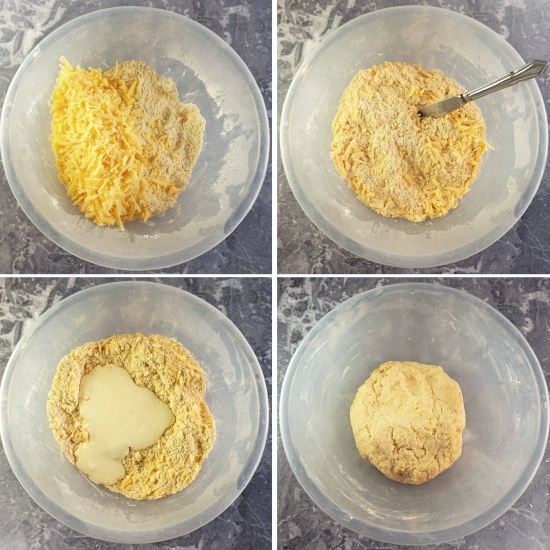
To start forming a soft dough, liquid is gradually added. I strongly recommend plain, full-fat yogurt as it really does make the scones extra light and fluffy. Alternatively, you could swap in milk for some of the yogurt, use all milk, buttermilk, or almost any combination of these. As different flours absorb different amounts of liquid it isn’t possible to be exact about how much you’ll need. The amount will also be affected by which liquid you use. But it’s likely to be around 250 – 300ml for 450 grams of flour.
Start by stirring the liquid into the dry ingredients with a silicone spoon or spatula. Then switch to your hands to gently bring the dough together.
ROLLING OUT & CUTTING THE DOUGH
To get delicate, fluffy scones, it’s important that you handle the dough as little as possible. So just give it a few seconds’ light kneading before rolling out onto a floured surface. To minimise the use of extra flour (which can result in hard scones), I recommend you get a silicone mat like mine to cover your work surface. This makes things less sticky as well as helping with clean up.
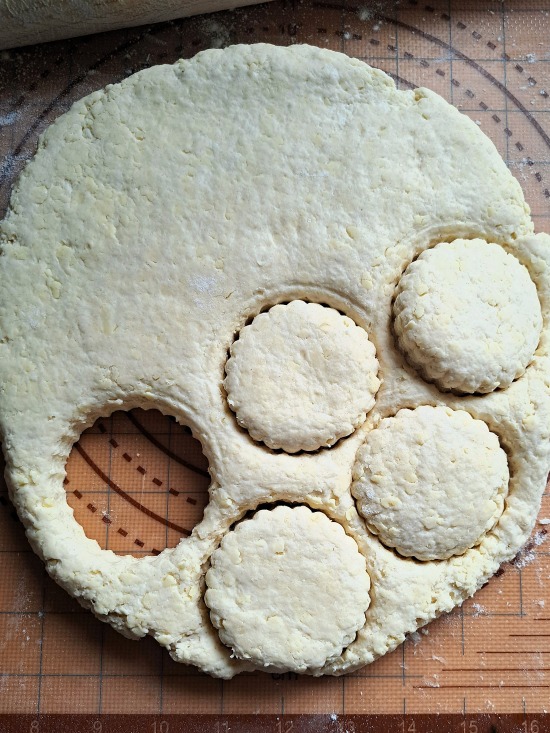
For a nice tall scone, don’t roll it too thinly. Between 2.5 – 3 cm is ideal. Stamp out the scones with a cutter, re-rolling any scraps to use up all the dough. I use a 6.5 cm fluted cutter which gives me 12 – 13 scones.
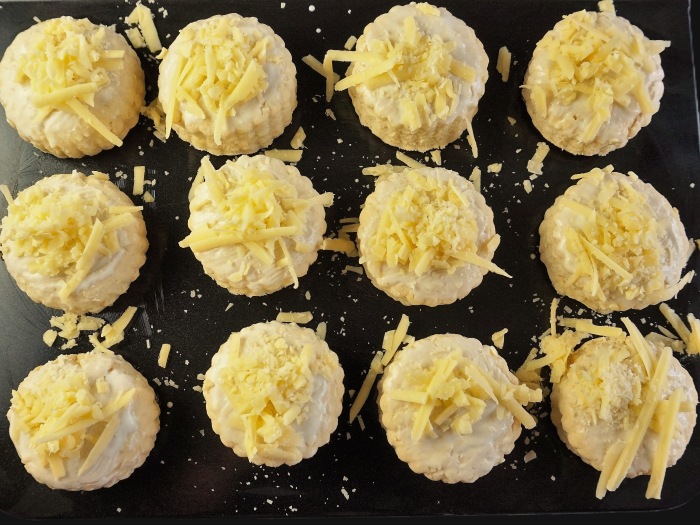
As you cut them out, transfer the scones to a baking tray, either non-stick, lightly greased or lined with baking paper. For extra cheesiness I sprinkle over more grated cheese. To help it stick, you can first brush the tops with a little yogurt thinned with milk or just milk.
BAKING, SERVING & STORING CHEESE SCONES
The scones are then put in an oven preheated to the temperature shown in the recipe card. They’re only going to take around 15 minutes to get nicely risen and golden. So don’t go wandering off once you’ve put them in. When they’re done, transfer the scones to a wire rack to cool a little, if you can resist the wonderful cheesy aroma.
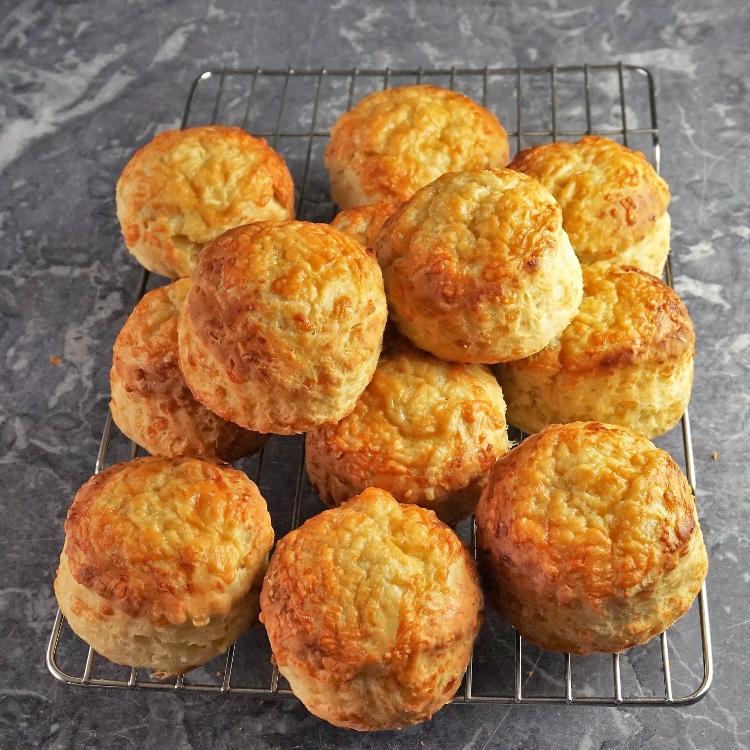
I think all scones are best served warm. But if they’re not going to be eaten straight away then store in an airtight container or freeze once they’re completely cold. A few seconds in the microwave or a few minutes in a low oven will be enough to warm them through again. These days, I reheat in my air fryer: around 3 – 4 minutes should do it. If frozen, I defrost and start heating them in the microwave (for speed) then finish in the air fryer for a crisper outside.
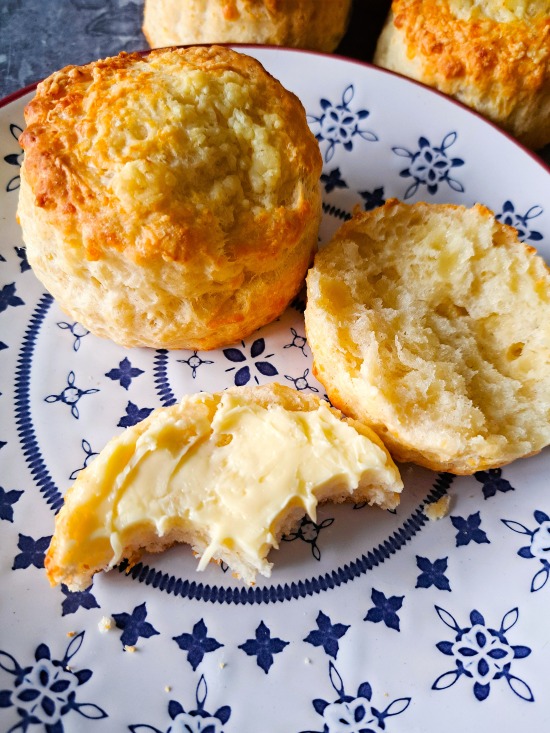
To make a wonderful savoury snack at any time, all a really good cheese scone needs is splitting and spreading with plenty of butter. But did you know that the best way to split a warm scone isn’t to cut it with a knife? Instead, gently pull apart into top and bottom using your hands. That way the all-important fluffy inside is retained rather than being squished together.
For something extra special, you should try Very Cheesy Cheese Scones as a quirky, savoury version of that British classic, the cream tea. Instead of clotted cream and jam, spread the warm scones with soft cheese and top with a chutney like my homemade Smoky Tomato Chilli Chutney. Gorgeous!
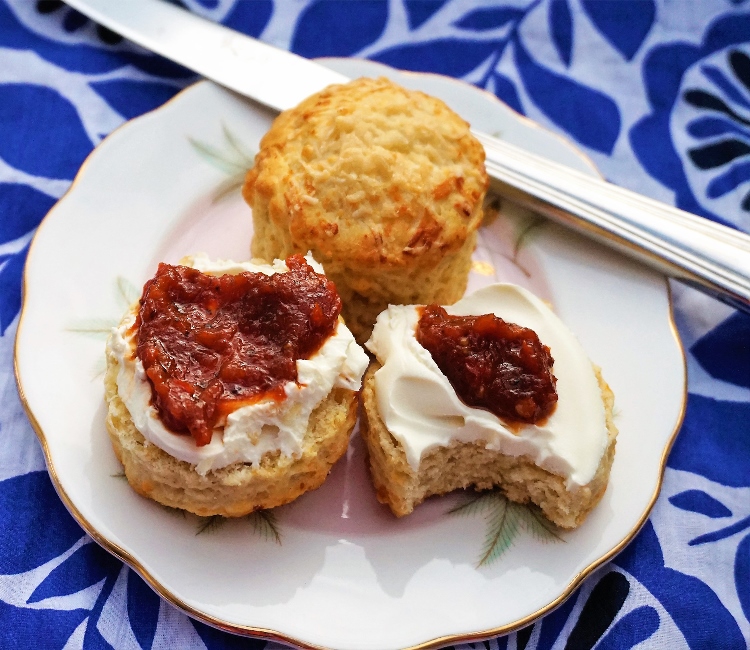
Or how about ramping up the cheese flavour even more? Try spreading cheese scones with homemade Potted Cheese. Of course, cheese scones can also be a great accompaniment to other dishes like soups and stews or salads. So quick to make, they’re also a good standby if you find you’re out of bread.
A VARIETY OF CHEESE SCONES
Once you’ve mastered easy Very Cheesy Cheese Scones, you can adapt them by adding all kinds of extras. The result is in infinite variety of delicious, savoury scones. Here’s some of the variations I’ve come up with since first writing this post: tap on the images to go to the recipes:
If you’ve made my Very Cheesy Cheese Scones, please leave a comment and rating to let me know what you thought.


Very Cheesy Cheese Scones
Possibly the fluffiest, cheesiest, best cheese scones ever!
So easy to make, Very Cheesy Cheese Scones knock the socks off shop bought versions and are ready in about half an hour.
It's recommended that you read the accompanying blog post before starting the recipe.
Ingredients
- 450 g self raising flour see Recipe Note1
- 2 level tsp baking powder see Recipe Note 1
- ½ tsp salt
- 50 g butter
- 250 g mature Cheddar cheese, grated see Recipe Note 2
- 250 - 300 ml yogurt (or milk, buttermilk or a combination) plus optional extra for brushing the tops of the scones
Instructions
-
Preheat your oven to 200°C /180°C Fan /Gas 6.
Have ready a large baking tray, preferably non-stick, or lightly grease it or line it with baking paper.
-
Sift the flour, baking powder and salt into a large mixing bowl.
-
Dice or grate the butter into the flour mixture, then rub it in using your fingertips.
-
Stir in 225g of the Cheddar cheese into the flour mixture (plus the extra Parmesan if using as per Recipe Note 2).
-
Gradually stir in enough yogurt (or your chosen liquid) to the dry ingredients to start forming a soft but not wet dough. Switch to your hands to bring the dough together into a ball.
Note: different flours absorb different amounts of the varying liquids so you may not need all of the suggested amount OR you may need a little extra.
-
Turn the dough out onto a work surface or silicone mat lightly dusted with extra flour. Briefly and gently knead it until smooth.
Roll out to approximately 2½ - 3 cm thickness. Stamp out scones using a cutter, re-rolling the scraps to make more until all the dough is used up. A 6.5 cm cutter should make 12 scones.
Place the cut out scones on the prepared baking tray.
-
Brush a little yogurt or your chosen liquid over the tops of the scones then sprinkle with the remaining 25g of grated Cheddar.
-
Place in the pre-heated oven and bake until risen and golden (approx. 15 minutes).
Transfer to a wire rack to cool a little.
-
Serve the scones warm, split and spread with butter.
Tip: pulling the scone apart into a top and a bottom half rather than cutting will keep the interior fluffy.
-
If not using straight away, cool completely before storing in an airtight container. Use within 2 days or freeze.
Reheat in a microwave, low oven, or air fryer.
Tip: to quickly serve frozen scones, defrost and lightly heat in a microwave then finish in an air fryer to crisp the outsides.
Recipe Notes
1. Self-raising flour and baking powder can lose their power quickly, so always make sure they're well within their Best Before dates. Once open, they should also be kept in air tight containers.
2. Cheese. For the best results, use a well-flavoured mature Cheddar cheese. You can also replace some of it with Gruyere or Parmesan or, even better, add an extra 30 grams of finely grated Parmesan to the dough.
This post is an updated version of one first published in 2018.

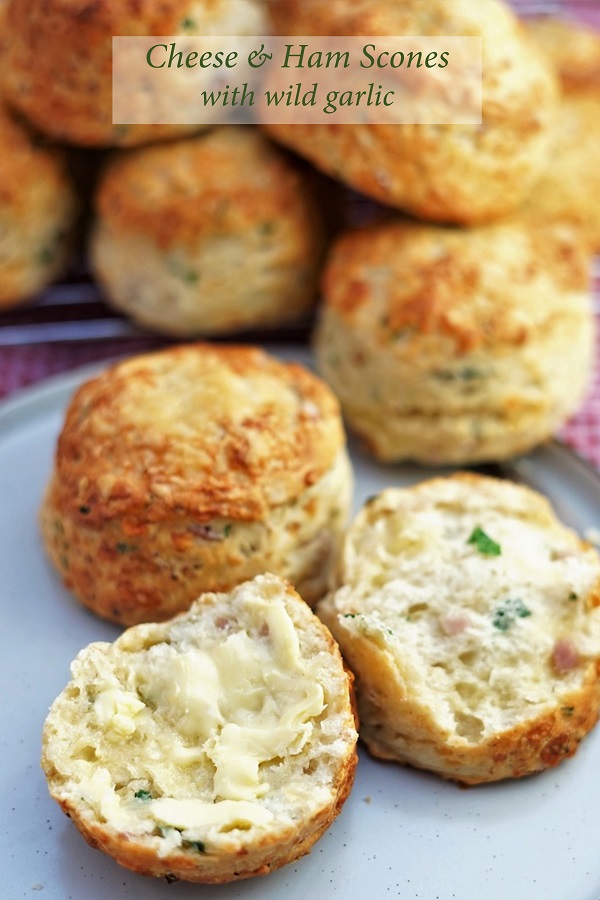
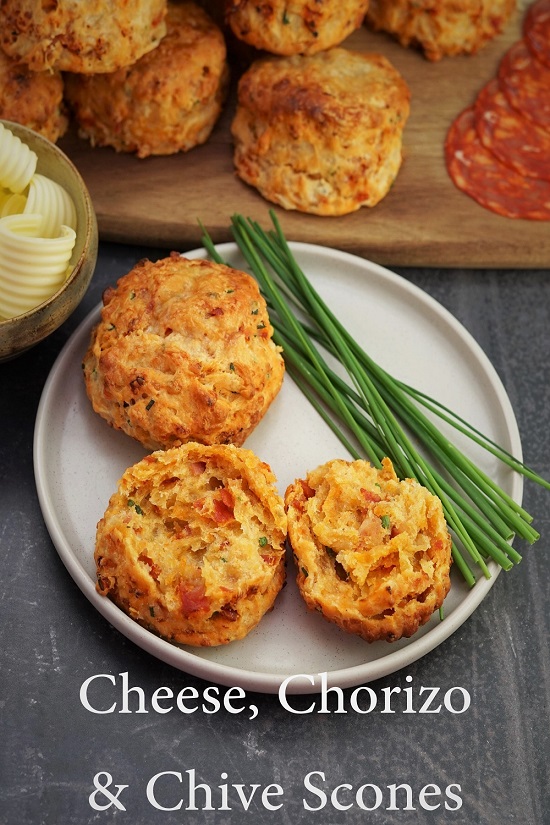
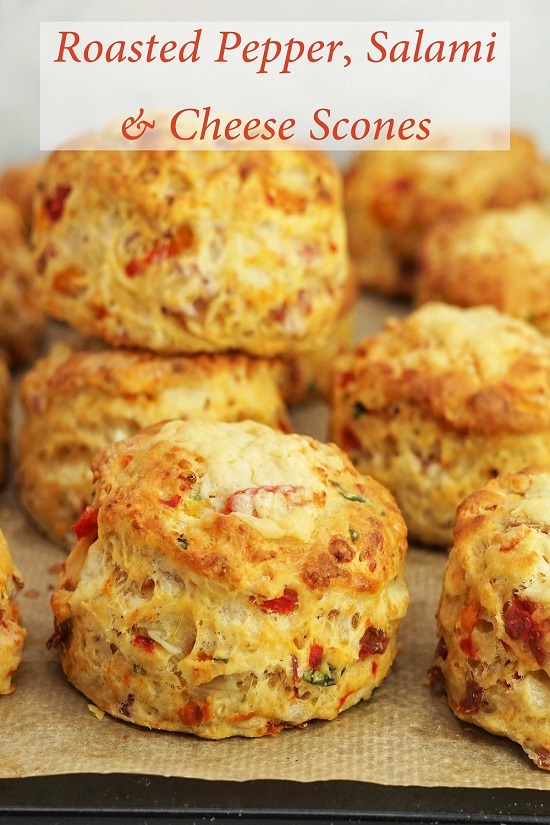
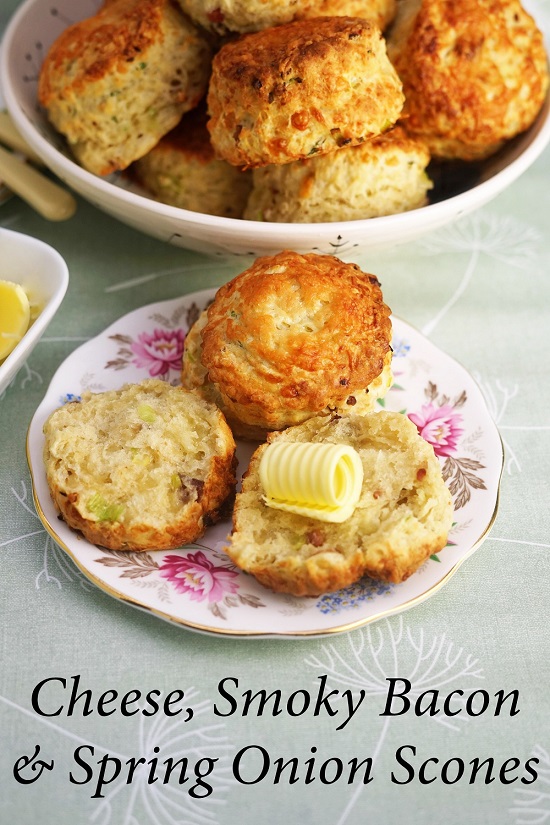
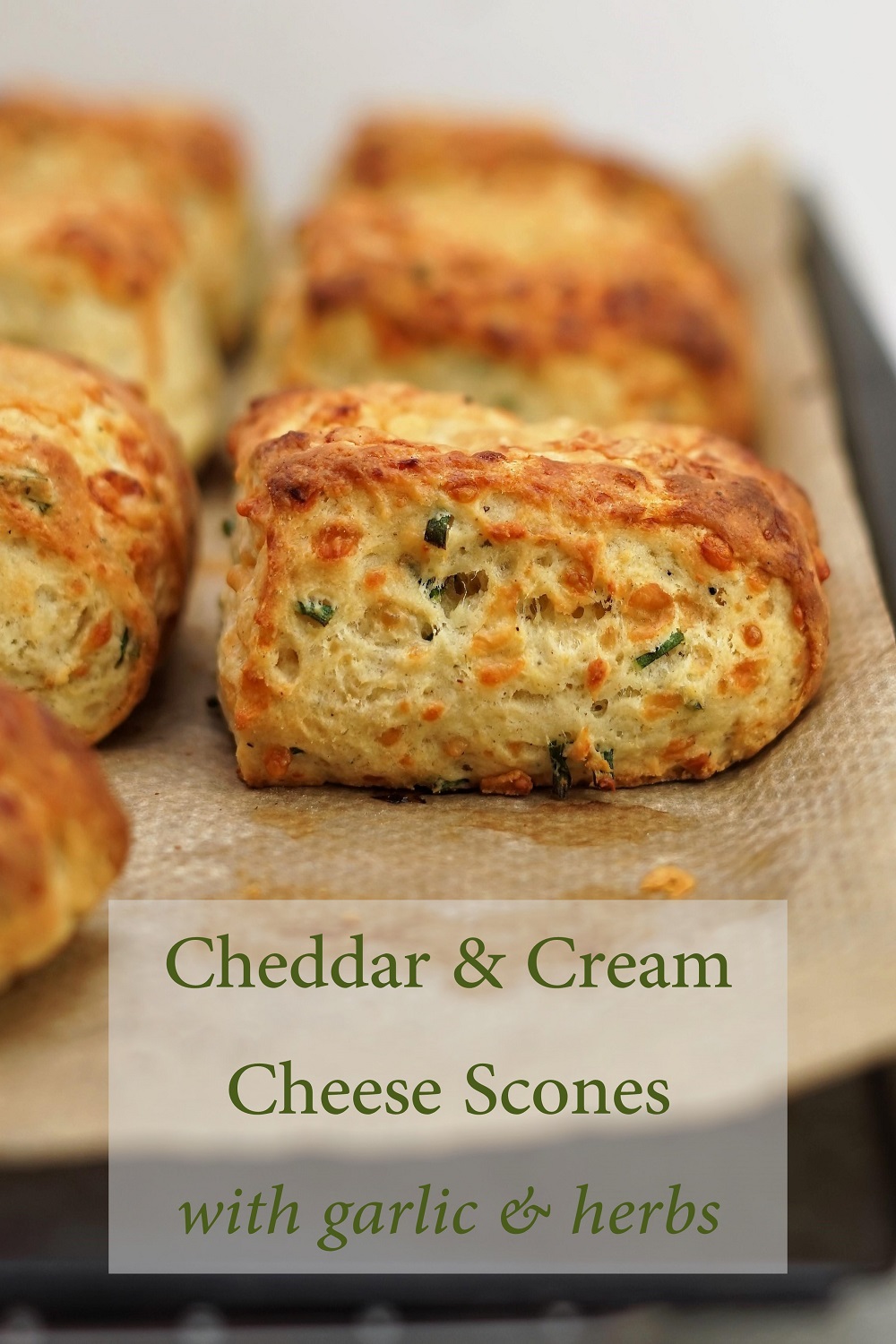
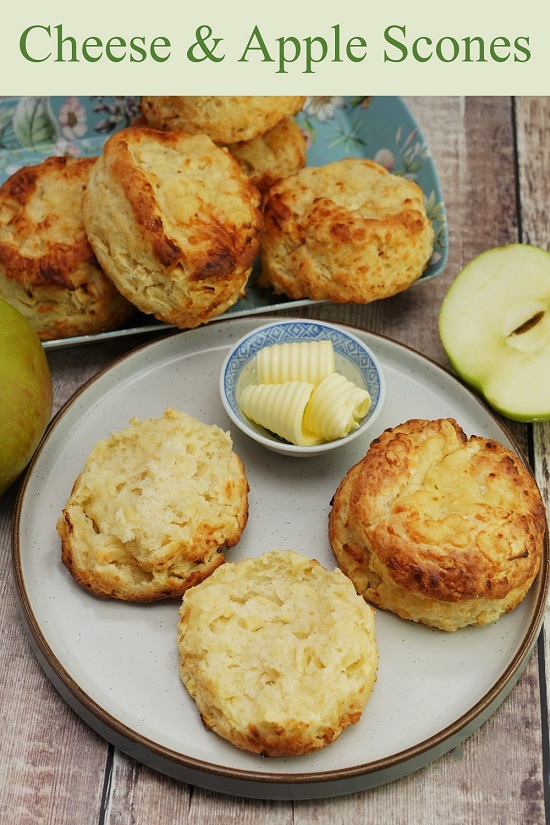

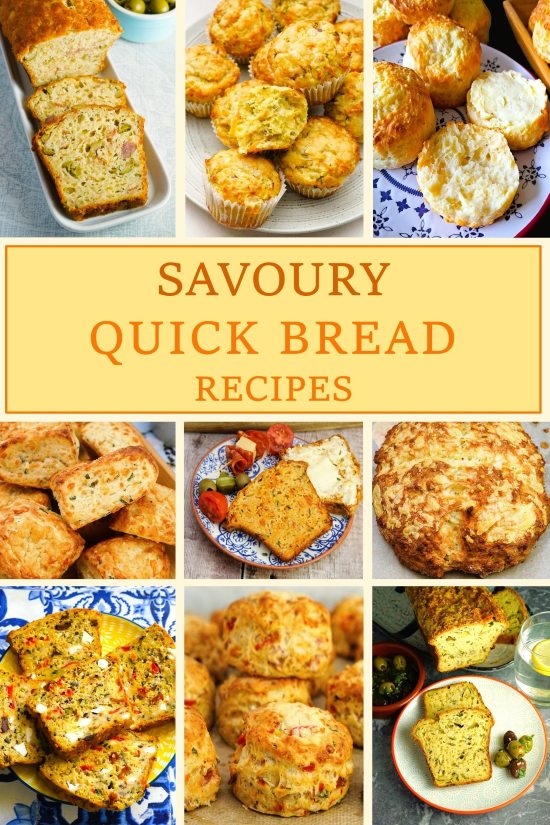
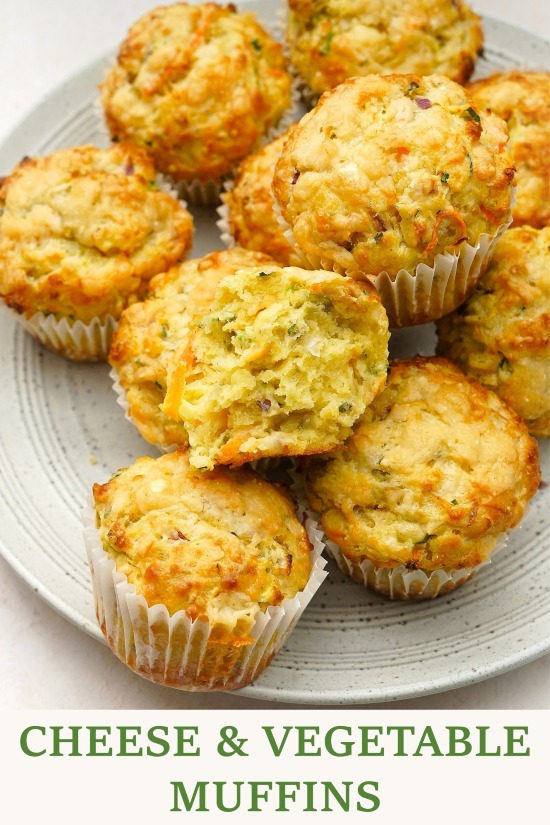
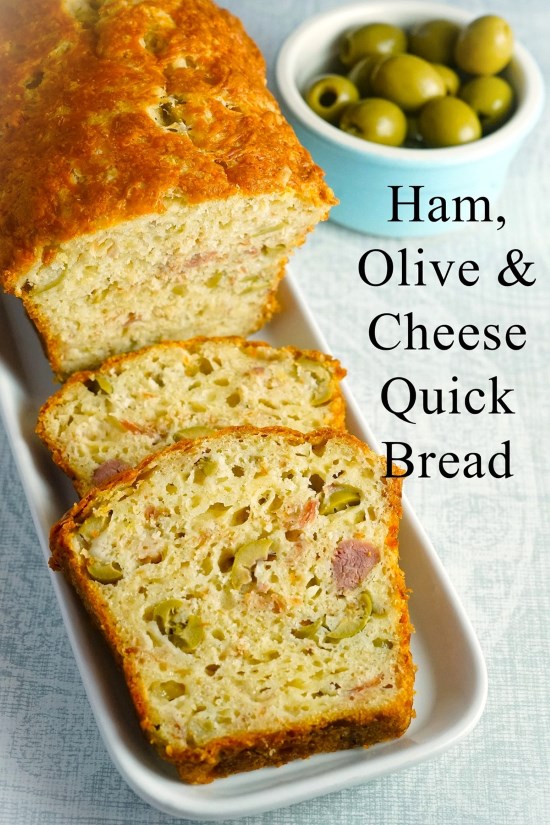
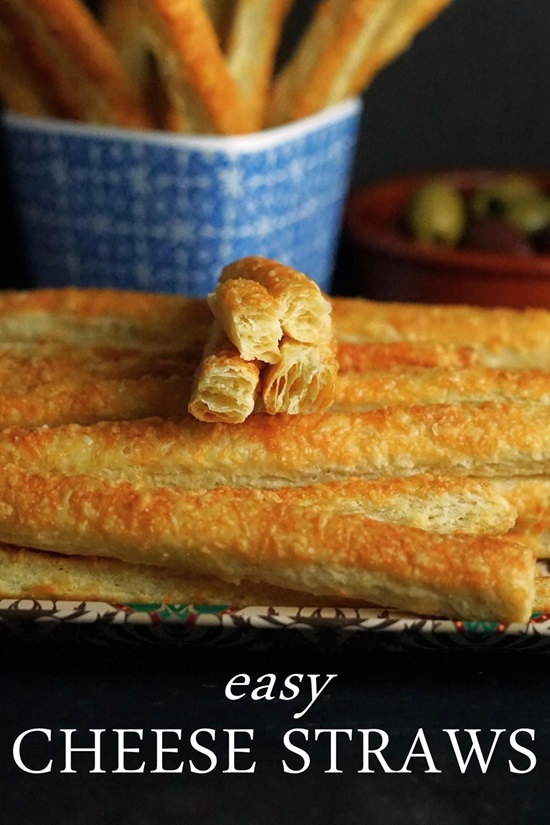
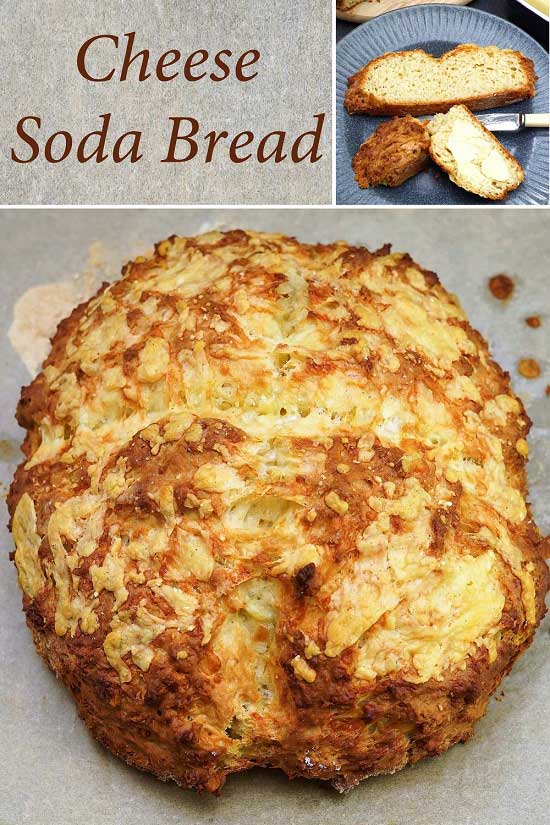
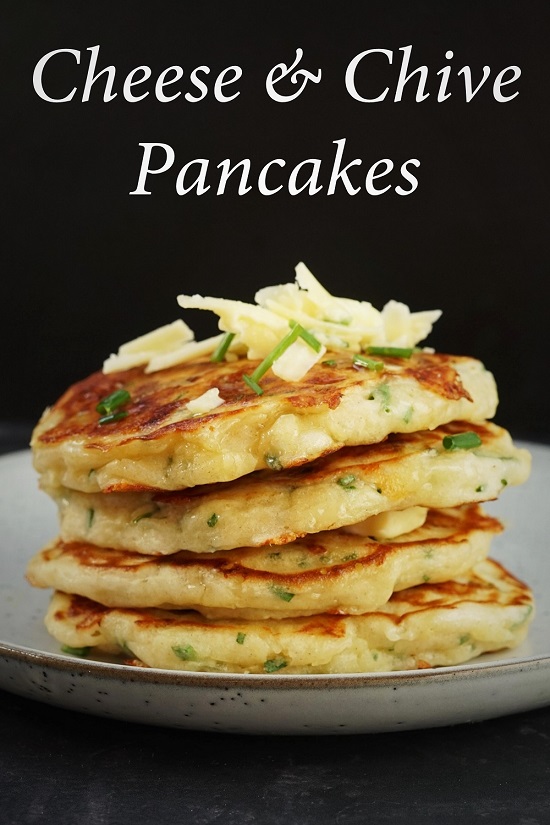
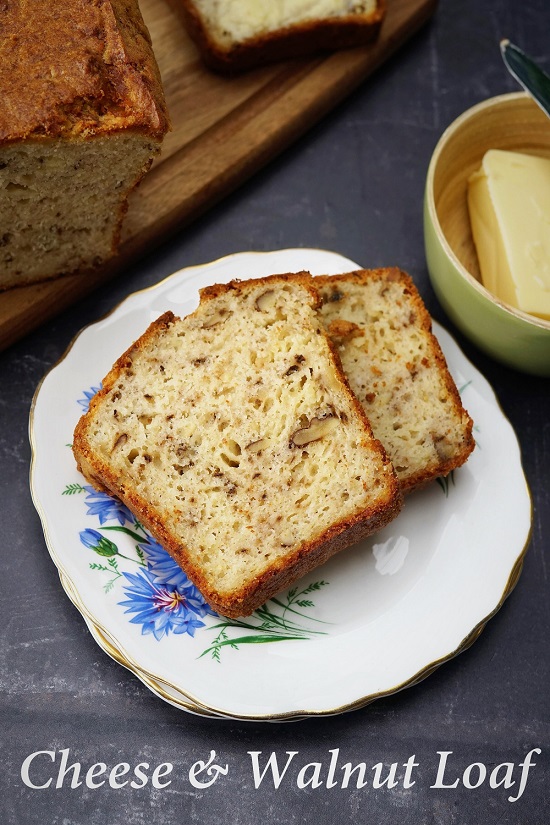
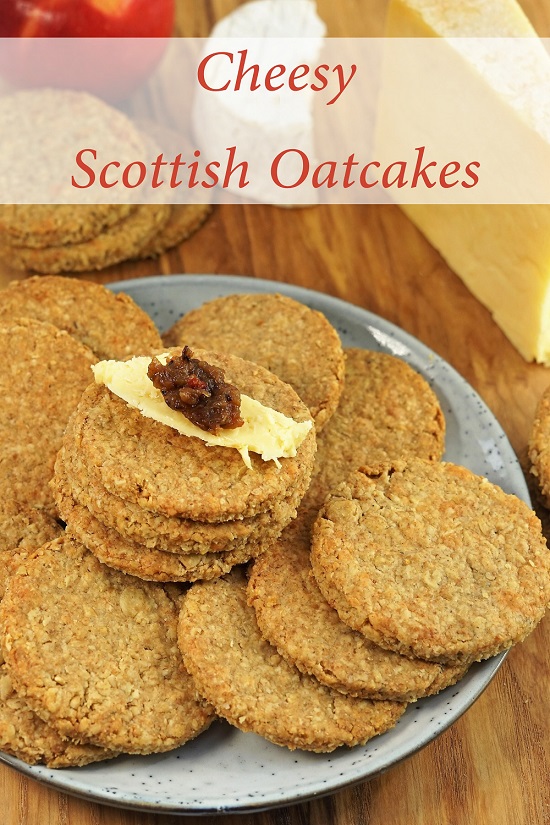
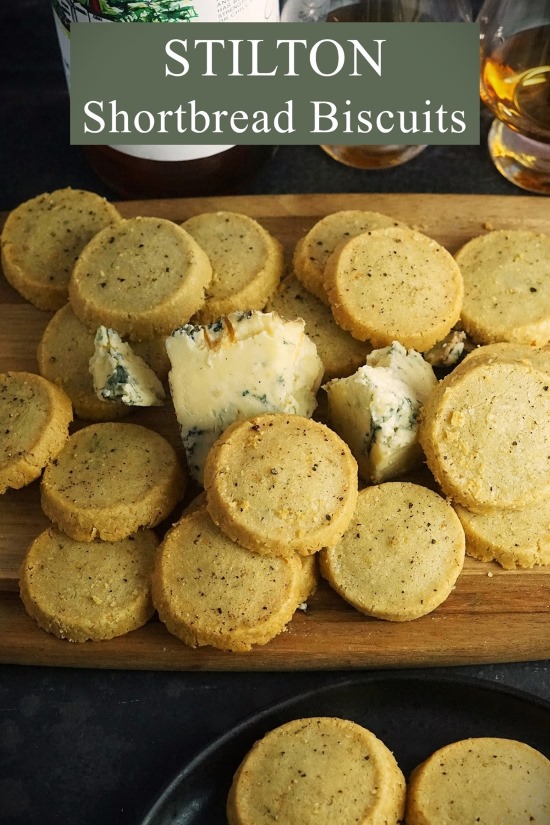
A non-Brit here! Do you have a trusted conversion method you use when converting self raising flour to regular flour? We cannot get self raising flour where I live, but I’d love to try more of your recipes after loving a few of your other recipes. Many thanks in advance!
Hi there! To convert plain/all-purpose flour to self-raising flour (which I think is what you mean), add 1 level teaspoon of baking powder for each 100 grams of plain flour and sift them together.
Thanks for the quick reply! I’ll try this tomorrow! For this recipe then it would be 4.5 tsps of baking powder (in addition to the additional baking powder that the recipe calls for). Can’t wait to try this!
Very delicious, light scones. I used part truffle cheddar with the mature cheddar and the smell and flavour was gorgeous. My first ever successful cheese scones! Thank you
Thank you for the great feedback Mel! I love the idea of including truffle cheddar in the scones – sounds delicious!
Everyone loves my (your) cheese scones! Thank you so much. Question: could I freeze the dough once cut out and then bake straight from frozen?
Hi Caroline, so pleased to hear that everyone loves ‘our’ scones! Although I haven’t done it myself, I know lots of people do freeze cut out scones and bake them straight from frozen. You’ll just need to add a few minutes of extra baking time.
The best Cheese Scone recipe I have tried. The yoghurt was a game changer. Tomorrow morning it’s going to be cheese & spring onion pancakes.
Thank you!
If you add water, what sort if consistency should the yoghurt be?
It should still be quite thick, so I would only replace at most half the yogurt with water. But, if you can, using just yogurt will give the nicest, fluffiest texture!
I loved your cheesy scone recipe but like others found that I needed more milk as I did not have Yoghurt. I also had to cook in my old oven for 23 minutes but they are delicious. Will try using yoghurt to see the difference. Thank you. Will check out some more of your recipes.
So glad you found them delicious!
Just made the cheesy scones. Absoloutely lovely! I don’t use a cutter. Rather I divide the dough into sections as you would a cake. Risen beautifully.
So glad you enjoyed them and thanks for taking the time to comment and rate my recipe!
Delicious scones , I did need to add a fair bit extra milk and will definitely be trying Gruyère cheese another time. My other half who said he doesn’t like cheese scones (how is that even possible !!!) was very impressed 😃
Thank you for the great feedback! Glad to have played a part in turning around someone claiming not to like cheese scones! Clearly they just hadn’t met the right scone yet! 😆
Definitely saving this recipe! I didn’t have any milk so used 250ml of water instead. Cooking time was 22 minutes. Checked after 14, 18 then 22 minutes. Plus they were quite big, only got 9 serves. I think it’s the best batch of scones I’ve ever made! 😁
Wow! Your best batch of scones? Thank you for the lovely feedback 😊.
Really enjoyed thise – made with blue cheese that needed using up plus a bit of pizza cheese and topped with bacon and pizza cheese. Just delicious.
Off to browse your other recipes!
They sound delicious!
Perhaps you’d like one of my own variations, with salami and roasted peppers? 😋 https://moorlandseater.com/roasted-pepper-salami-cheese-scones/
Thanks so much for getting in touch!
Loved this recipe. Followed it to the letter and got perfect scones! Looking forward to trying out more of your lovely recipes 😍
That’s lovely to hear!
Hello,
I love your recipes & your homemade crackers are a big hit. I have been told by my doc to reduce my carbs to around 50-80g a day so I have bought some low carb flour (not almond or coconut flour) My daughter is going to make some of your recipes today starting with these. No idea how these will turn out but I’m hoping they are ok! Lowering carbs sounds like a nightmare but if it saves my health I will have to give it a go. I don’t suppose you have any tips?
Hi Sue, many thanks for your kind words about my recipes.
I’m afraid low carb baking really isn’t my forte. Although I do better weight-wise not eating lots of carbs such as flour, the way I do that is try (not always successfully!) to keep treats like scones for the weekend. But, given the advice you’ve received from a doctor, you might be best looking for specific low carb recipes. Sorry I can’t be more helpful, but good luck on your low carb journey.
Nice recipes here. Made the cheese scones and will do others soon.
Thank, you Allex!
Wow! Best cheese scone I’ve ever used. These are so light and fluffy and cheesy. Delicious. Thanks so much for sharing. Going to try some of your other recipes.
Thank you! So pleased you enjoyed them!
Having tried your sultana scone recipe very recently which was amazing,I today made your cheese scones. They were absolutely delicious,light,fluffy with a lovely golden crisp top. You dear Moorland Eater could show a lot of the TV chefs/cooks a thing or two! Thank you for another brilliant recipe. X
Incredible feedback Andrea, thank you! So happy you’re enjoying my recipes.
Amazing! For years I’ve tried to make scones that taste like these, they are absolutely delicious! Thank you!
Only question I have is how do I stop myself from eating too many, they are just soooooo good!!!
Thank you for the lovely feedback Jennie, you’ve made my day! No solution to resisting the urge to eat too many I’m afraid – if you find the answer, let me know! 😄
Have you any comments about whipping a egg into the yoghurt before adding to the dried ingredients. I find the addition of the egg assists in enhances the texture. You have to be congratulated for producing this soft and light recipe.
Tom
Hi Tom, thanks for your kind comment about my soft and light recipe!
I know some people do add an egg to scones and I did receive a question about it (see Reeve’s comment below Sept 2020). My view is that eggs weren’t traditionally added to British style scones like these. My mother (born 1931) never put eggs in hers and my recipe books from the 1970s don’t include them either. I only put eggs in American style scones which I feel are more cake-like anyway.
But if people prefer the texture of scones with an egg, then I’ve no objection! I guess you perhaps reduce the amount of other liquid to compensate?
Thanks for your interest in my recipe, Tom.
I have to say, the yoghurt made all the difference in this recipe. I first tried it with milk & found them to be a bit doughy in texture compared to the yoghurt. These will definitely be a regular in my house as everyone who tried them said they were amazing. They were hardly out the oven & my son & hubby had scoffed 2 each.
I will never eat shop bought scones again. Thank you, thank you for sharing this recipe x
What lovely feedback, Sandra! I agree, you can’t go back to shop bought scones after really good homemade.
Thanks so much for taking the time to comment and rate the recipe.
Can I add dough enhancer instead of baking powder. If so, how much should I use
Dough enhancer is not something I’ve ever used so can’t advise on that I’m afraid.
These scones turned out perfect! They had the right amount of cheese and had a lovely, fluffy texture. Thank you for a wonderful recipe!
Thank you for your lovely feedback Renata. So glad you loved my recipe 😊
Fantastic scones !
Thank you so much Linda!
Wonderful home cooking x thank you
Thank you for your lovely comment ☺️
I so enjoyed your cheese scones. Will always use yoghurt in future. Thanks very yummy 😋
Thank you, Christine! So pleased you enjoyed the cheese scones.
Mmmm, the scones came out really well considering my first time. I used all the milk and the dough was slightly cracking so I wondered if I needed more milk but they seemed ok. I just don’t know when scones are cooked as mine were nowhere near done at 15 minutes and took about 25 but still tasted lovely and weren’t dry. I think I just got lucky lol 🙂 So is there a fail safe way to test if scones are cooked please?
Hi Jules,
Glad you enjoyed my Very Cheesy Cheese Scones!
Different flours do absorb varying amounts of liquid, so don’t worry if you find you need a little more than the recipe calls for. Sounds like they came good in the end!
25 minutes does seem quite a bit longer for the scones to cook than I’d expect, but again ovens can vary greatly. As with checking when cakes etc. are done, you could test with a cocktail stick or skewer: if it comes out clean then they’re done.
Many thanks for trying my recipe and giving your feedback!
Great recipe, thank you. I’ve been using mine for forty years and thought I’d have a change, and yours is much better! I used half Greek yoghourt/half milk and the scones rose nicely and were light and not stuffy. As usual, I added caraway seeds. I’ll now use this recipe for the next forty years and look forward to trying out some of your others.
What lovely feedback on my recipe, Ruth! Very honoured indeed to learn that you prefer this to your tried and tested 40 year old one.
Many thanks for taking the time to get in touch.
Amazing scones! These are now a family favourite, they call them ‘mums cheese scones’ Shhhhhhh! And thank you x
Fantastic!
Amazing it was the most best scone I have ever tried thank
Thank you Erin!
Loved taste of this recipe but was diappointed they rose very little. How do I get mt scones to rise more???
Hi Judith,
If you’re following the recipe to the letter and not rolling the dough less than 2-3 cm thick then your scones should rise well. However, there is another proviso: make sure that your self raising flour and baking powder are well within date and have been kept in an airtight container in a cool, dark place.
If you look at the discussion I had with Bridget further down the comments, you’ll see she had a similar problem until she bought all new ingredients. She then found the recipe worked for her and happily, awarded the recipe 5 stars!
Let me know how you got on if you decide to have another go.
Hello, I had the best tasting cheese scones when I was in a SUNDERLAND visiting and I vowed to look for a recipe that didn’t look too challenging and try them for myself. Well, I have tried making these twice and have had the same problem as Bridget and Judith. I’d like to enclose some photos. The first time I made them I just decided it was mismeasuring on my part. However, I bought a very accurate little kitchen scale and measure everything to the T, check the dates on the flour and baking powder, and still, I too find the amount of flour to be too much or the amount of yogurt too little?. My butter does not get rubbed in to all that flour either. I rolled the dough to 3 cm & though I had a hard time getting the dough into a ball, I did get a dozen scones. Final result was tasty but not fluffy & about the same height coming out as going in. Please help. BTW, I’m in Canada…can’t think of a reason why that would make a difference but thought I’d add that anyway! Also, I found the recipe very easy to follow right from the get-go so I’m not insinuating that it’s the recipe itself. I just don’t know what I’m doing wrong. Sorry, can’t seem to post photos.
Kind regards, Shirley
Hi Shirley,
Sorry to hear that your scones didn’t rise. Sounds like you’ve followed the advice given to a couple of others who had similar problems so I’m really not sure what the issue can be: most people who try it find the recipe works.
Here’s a few more thoughts anyway.
Did you definitely use self raising flour as well as baking powder? Note also that it must be baking powder, not bicarbonate of soda.
You say you had a hard time getting the dough into ball which implies you need more liquid. Flours do absorb different amounts of liquid and it sounds like yours is a particularly thirsty one!
I find that I don’t always need all of the 250ml which shows just how different flours can be from one batch to another.
A dry mixture may also affect the rising as baking powder requires liquid to become activated and produce the carbon dioxide needed for the scones to rise. Perhaps this is the issue?
Also, don’t worry that the small amount of butter means that the rubbed in mixture may not look like what you’re used to: the large amount of cheese in this recipe is providing plenty of fat too.
I hope these points help and you have better success if you try them again!
When you cut the scones, do not twist your cutter because this stops them rising properly. Just cut down and take out, no twist.
Good point Kaye!
These scones very tasty, but seemed too much flour , had to add more. Will try yoghurt. Was bit disappointed with very little rising. Thx Kaye, I DID twist my cutter as had a problem getting them out without handling too much., next time I’ll quickly dip cutter into flour first. Will make these again 🙂
Hi Margaret, glad to hear you found the scones tasty but was disappointed with the rise.
Different flours do absorb different amounts of liquid – perhaps yours was particularly thirsty as I usually don’t need to use all of that stated in the recipe.
If, other than that, you’re following the recipe to the letter and not rolling the dough less than 2-3 cm thick then your scones should rise well. However, there is another proviso: make sure that your self raising flour and baking powder are well within date and have been kept in an airtight container in a cool, dark place.
If you look at the discussion I had with Bridget further down the comments, you’ll see she had a similar problem until she bought all new ingredients. She then found the recipe worked for her and happily, awarded the recipe 5 stars! It’s interesting to note though that, originally, she also added more liquid than stated in the recipe – I wonder if you might be adding too much? Also, try to handle the dough as little as possible.
Hope this helps and thanks for trying my recipe.
This recipe makes fabulous scones. My normal recipe calls for buttermilk and egg. The yoghurt makes a far lighter scone, worthy of a place on any afternoon tea
Thanks for your lovely comments Ian! So glad you enjoyed the cheese scone recipe.
Lush!!
This is by far the only cheese scones recipe i have tried that have successfully turned out as expected(as pictured)! Still registering….. and i have tried many found online. I usually test out recipes by halving all portions to just have a smaller amount to try while following all the steps as exactly as i can! I suppose many factors could contribute to why a recipe might or might not work for someone trying it such as different ovens and how they distribute heat differently or even whether ingredients used are close to same as one used by recipe owner etc. Thank you very much Lynne! 😊
Thank you for your lovely comments, Pamela!
I agree, there’s so many different elements affecting how a recipe turns out, so individuals can get varied results. I’ve yet to find a crumpet recipe that works for me, despite trying lots of recipes that receive praise from others: still working on that one!
Thanks again for taking the time to comment.
I don’t really know how to rate this recipe because have tried it 3 times and every time the scones have failed to rise, and I’m an experienced baker. I measure all the ingredients perfectly, and on the last 2 occasions I have had someone standing double checking everything. I add all 250ml of yoghurt and the mixture just does not combine, there is still way too much flour. So I start adding milk bit by bit until I can finally combine the mixture, but by this time I have worked it so much which I suspect is the problem. I make “normal” scones successfully all the time so I know not to overwork scones, but I’ve been looking for a “very cheesy” scone recipe and haven’t yet found one that tastes good. Can I ask what brand of yoghurt you use? I use Yeo natural yoghurt – is that too thick so that it doesn’t make the mixture wet enough? Thanks very much
Hi Bridget,
That is strange!
At the time I’m writing this, all the ratings for the recipe are 5 star which suggests there isn’t anything fundamentally wrong with the recipe. As I have a poor memory for amounts of flour etc. when baking, I myself always follow this recipe as written and haven’t had problems. So I’m a bit stumped!
As to the yogurt, the recipe was actually created using Yeo Valley yogurt as that was the brand I bought before I started making homemade yogurt. I still use it occasionally, so it can’t be that.
I think the obvious culprit for a failure to rise is the flour. Are you definitely using self raising flour as called for in the recipe? There’s baking powder too, so together they should create quite a tall scone so long as you’re not rolling the dough too thinly. I’m guessing you’re not doing that though as you’ve made other scones successfully.
Have you double-checked that your self raising flour is not out of date? While I’ll happily use some products past their ‘Best Before’ date, I find self raising flour can quickly lose it’s ability to make things rise, especially if the bag’s been open a while. Similarly, is your baking powder well within date?
However, I do find it strange that there’s ‘way too much flour’. If anything, I find that all 250ml of liquid is not always needed rather than needing to add more. Different flours do absorb different quantities of liquid, but I wouldn’t expect the difference to be so great as you seem to have experienced. I’ve used different brands (e.g. supermarket basics, Dove’s organic) without much noticeable difference. Are your kitchen scales definitely accurate?
I can’t really think of anything else it could be, but if you do try again I hope you’ll let me know how you get on.
Hi Lynne, thanks so much for your detailed response and many apologies for the delay in replaying back to you. I have finally had the chance to try them again and I bought all brand new ingredients yesterday. I sieved the flour and baking powder twice as I do for sweet scones, and am delighted to say that it finally worked for me! 6 of the scones are gone already and there are only 2 of us here! The flavour is delicious, and indeed they are very cheesy, so I will be making them again!. Thanks very much for sharing your advice and experience, much appreciated! Take care in these crazy times, regards Bridget
That’s great news, Bridget! Thanks for trying again: I’m so pleased you got the cheesy scones you were looking for in the end!
Perhaps older self raising flour and/or baking powder was the culprit after all.
Thanks for your feedback again and for rating the recipe!
Best wishes, Lynne.
Incredibly easy, and fast method, delicious taste and consistency.
NB I also grate the. Butter straight from fridge which speeds things up and iAds at the same time as the cheese. Thank you (my Mum’s favourite, I shall be taking to her today she’s terminally ill and this is one thing she’s always got the desire still to eat 😋)
Thank you, Victoria. So glad you enjoyed the recipe.
Best wishes to your mum. Hope she loves them too.xx
Hi I’d love to make these but need help with the recipe please – if I was to use buttermilk do I dilute with water and if so how much buttermilk would I use?
Hi Linda,
The recipe is very forgiving so if you like you could use all buttermilk OR buttermilk diluted with water. Obviously all buttermilk would be richer, but I’ve given options for diluting it (or for diluting yogurt or milk) as I don’t think it makes much difference to finished scones which is good if you don’t have quite enough of the yogurt, buttermilk or milk.
In terms of how much to dilute, I’d say you could probably replace a quarter to a third of the buttermilk (or yogurt or milk) with water with no problem.
Hope this helps!
Lovely. I normally would add an egg with the milk. (Delia’s recipe which isn’t cheese enough hence trying yours ) Is there a reason Why you don’t use an egg ? Thank you
Hi there,
I’m not sure that eggs were traditionally added to British style scones like these. Certainly my mother never put eggs in hers. Recipe books I have from the 1970s don’t include them either. I only put eggs in American style scones which are really more cake-like anyway.
If you’re happier adding an egg, then there’s no reason why not. Just reduce the amount of milk accordingly. Would perhaps be interesting to make a batch of both, see if there’s a difference and which you like best.
Hope you like mine better than Delia’s anyway! 😄
Excuse my stupidity, but if, as you suggest we change to sun dried tomato and feta for instance is it still the cheese scone basic recipe with the addition of these ingredients? Or, instead of the 250g cheese we use 250 g feta/tomatoes? Thanks for helping.
Hi Tracey,
I’m sure you’re not stupid, so perhaps I could’ve been clearer 🙂
I would use the suggested flavourings INSTEAD of the cheese in the original recipe. Otherwise the balance will be off and the scones may be heavy.
These are the best scones I have ever made just a couple of tweaks. I used oat milk which was fine & added 2 teaspoons of chilli powder for a little kick. They were delicious.
Very kind of you to say so, Dorothy!
I sometimes add a little picante smoked paprika for a smoky hit.
Thanks so much for taking the time to comment and rate the recipe.
Thses cheese scones are delicious! At first I thought I made some mistake when I measured the cheese, but nope! They are just very cheesy (as the title says) but they are also the best scones I’ve ever made!
Thank you Ella, so glad you liked them! Definitely mustn’t skimp on the cheese. 🙂
Best cheese scones I’ve ever made.
Thank you, Lorraine. Very kind of you to say so!
Please could you confirm the oven temperature is 180/350/gas 4
It’s just all the other scone recipes I’ve looked at and tried, say 200 gas 6 ?
Thank you
Thanks for pointing that out, Jude!
I see an error crept in because I put 180C instead of 180C Fan and then converted that to gas 4.
I’ve now corrected it to 200C/180C Fan/Gas 6. I’ve left off the F temperature as I no longer include it (this is one of my old recipes).
Thanks again.
I was wondering about the temperature too! I understand your instructions to mean 200c is for bake, 180c is for fanbake is this correct ??? (I guess Gas 6 is for gas oven :-)) Margaret
Yes, that’s correct!
Just made these added a pinch of cayenne pepper and half a tsp of mustard powder and used black bomber cheese absolutely delicious served warm from the oven.
Fantastic!
Many thanks for taking the time to rate the recipe & comment, Steve. I always love to hear how people are enjoying my recipes!
Been looking for a perfect cheese scone recipe. This is right up my street! Perfect for possible varieties. Tried the plain one & another batch with roasted peppers, red onions & mixed herbs…just amazing! Thank u..
Thank you, Mae! Love the sound of your roasted pepper version!
I’ve made these a few times now, they are amazing, I always use half extra mature cheddar half stilton. Thank you
So glad you like them, Jen and thanks so much for taking the time to rate the recipe and comment. Half stilton, half cheddar sounds great!
Wonderful! Perfect straight from the oven with a tea!
Fantastic! So pleased you liked them. 😁
And thank you for taking the time to rate the recipe and give feedback – I love hearing from people who’ve made my recipes!
Wow, they worked perfectly, I have never made scones that could compete with mum, either in flovour or hight, but she would have been proud of me with these beauties. I tweaked a little as my husband had purchased some really strong cheese from South Melbourne markets , I decided to only put in 150g of cheese and sprinkled parmisan on the top. The yoghurt/skim milk mix worked a treat. Thankyou so much for the recipe, I shall make the fruit scones next week.
So glad you liked the cheese scone recipe Trudi and they could compete with your mum’s! Hope you like the fruit ones just as much.
Many thanks for taking the time to give feedback and for the 5 star rating!
I do have a history with cheese scones. I love eating them but they come out awful, more biscuit like. I liked the fact that there was so much cheese in this recipe so had to try it! Came out brilliantly, thank you so much! Had a bit of an issue with the mixture sticking together but came out well in the end. Mixed parmesan with the cheddar on top to make them zing cheesiness. (ps) love my scones with soup!
So glad your scones came out brilliantly, Chris! Love that they zinged cheesiness – so disappointing when you can hardly taste the cheese in a cheese scone! Thanks so much for your feedback and for rating the recipe.
First attempt. Looking good. Not as deep as I would like but my fault entirely. Taking them to my WI coffee morning. So will give you the feedback later. They take no prisoners and we aren’t all Paul Hollywood 😁
I’m feeling rather nervous that my recipe will be judged by the WI! Hope they (and you!) like them. I see in the blog post I’ve suggested cutting the scones out at a thickness of 2-3 cm, but in the recipe I’ve put 2cm. I think nearer 3cm is the way to go if you like deep scones (I do!) so I’ll amend the recipe to also say 2-3 cm. Let me know how you get on!
Great feedback. I do need to tweak it a bit. Used mature cheese and parmesan but not Cheesy enough for me. I think a pinch of mustard too nxt time. Still lovelt though. Thank you. X
Many thanks for the feedback, Marilyn. Glad they went down well!
I think the success of cheese scones really is down to the tastiness of the cheese. Good to have some Gruyere in the mix if you have it. Lots of people put mustard in cheese scones, but I must say I’ve never been a fan. But the beauty of the recipe is that you can tweak it to your own taste, so hope I’ve given you a base to create your own perfect cheese scone!
Should recipe say 250 and not 450 g of sr flour as i had a real job mixing it all together
Hi Wendy,
450g of flour is correct. As I have trouble remembering ingredient amounts in baking I actually follow this recipe myself so can vouch for it.
Different flours will absorb different amounts of liquid so perhaps you might have needed to add a little more yogurt, milk or whatever you used as the liquid?
Do let me know how it goes if you decide to try again.